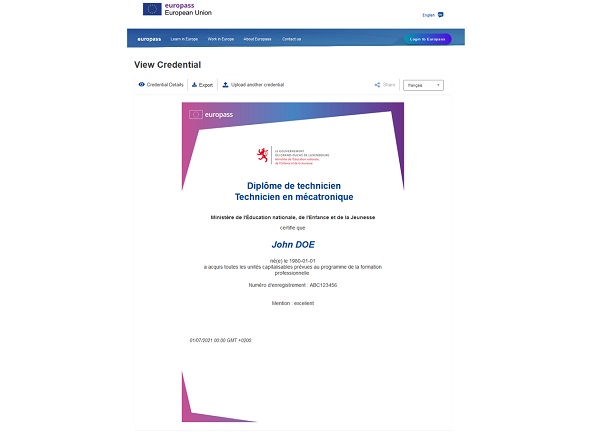
An online event on Monday marked the official launch of the European Digital Credentials for Learning (EDCL) system across the European Union (EU); the launch took place in the presence of Nicolas Schmit, a Luxembourgish politician serving as European Commissioner for Jobs and Social Rights.
Since 2019, Luxembourg, along with seventeen other countries, has played a pilot role in the implementation of this new tool, designed by the European Commission as part of the Europass platform. In 2019-20, six professional training programmes took part in the pilot phase; 174 students received their digital achievement certificate.
In 2021, Luxembourg was the first European country to issue more than 1,600 such certificates to all students in vocational training. A total of 529 technician's diploma (diplôme de technicien - DT) certificates, 951 vocational aptitude diploma (diplôme d'aptitude professionnelle - DAP) certificates and 134 vocational capacity certificates (certificat de capacité professionnelle - CCP) were transmitted digitally in addition to the traditional paper format. Among the pilot countries which have passed their test phase, Luxembourg recorded the highest number of EDCLs awarded to graduates of vocational education and training.
Commissioner Nicolas Schmit commented at the launch: “[I]n today's digital world, it is essential that citizens can showcase the skills they have acquired in a secure and digital way. This is precisely what the European digital certificates of achievement, the Digital Credentials, do. Today we are launching their official rollout across Europe and I am very impressed with the progress made by Luxembourg regarding their adoption during the pilot phase. The digital certificates will benefit both citizens looking for a job or undertaking studies, and companies”.
EDCLs are designed to allow:
- students to prove the validity of their diploma or certificate;
- for educational institutions across Europe to issue diplomas and other learning certificates in an easy-to-generate format;
- recipients (employers, universities, etc.) to easily verify the authenticity of harmonised documents;
- to contribute to a common understanding of qualifications and qualifications across and beyond the EU;
- to promote the recognition of qualifications, skills and abilities acquired in formal and non-formal contexts throughout an individual's life.
The ECDLs are deposited in the student's Europass area. They can then send the link to their digital certificates by email to their potential employer, university, etc.
The EDCLs are available in several languages.








